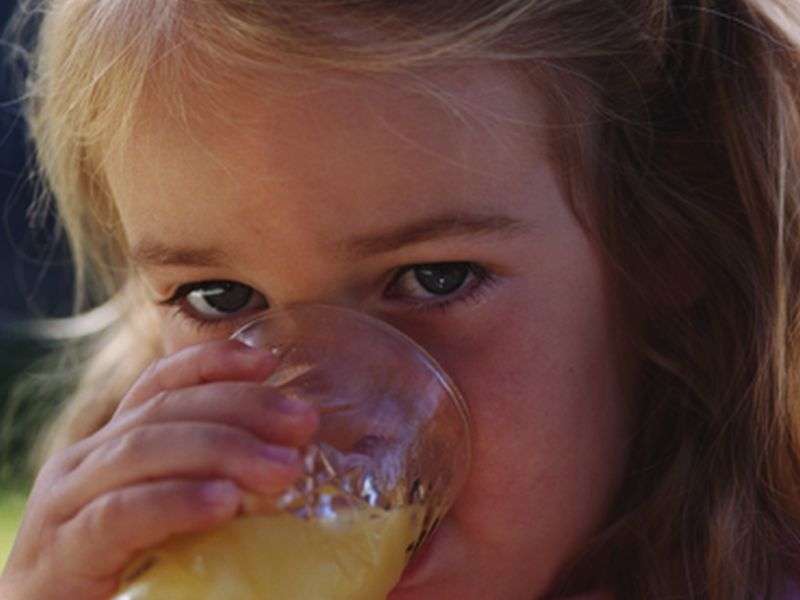Fruit juice for kids: A serving a day OK

(HealthDay)—Pediatricians have long suggested that fruit juice may prompt weight gain in children, but a new review finds it harmless when consumed in moderation.
"Based on the current evidence, we didn't find that consuming one serving [of 100-percent fruit juice] a day contributes to weight gain in children," said study author Dr. Brandon Auerbach. He is acting instructor of medicine at the University of Washington, in Seattle.
To come to that conclusion, the investigators analyzed the results of eight published studies involving over 34,000 children that looked at fruit juice intake and the effect on weight.
Children under the age of 6 who drank a serving a day gained a small amount of weight, but not enough to be clinically significant, the findings showed.
The amount was truly tiny, less than a pound over a year's time, Auerbach noted. And the review did not prove that fruit juice consumption caused the weight gain.
In addition, children aged 7 to 18 who drank a serving a day saw no clinical effects on weight, the researchers said.
The younger children favored apple juice, while the older ones were more likely to drink orange juice. The study authors explained that orange juice, which has a lower glycemic index, may be linked with less weight gain. Food and drink with a lower glycemic index are linked with lower and slower rises in blood sugar levels.
The researchers stressed that their report specifically focused on 100-percent fruit juice, not fruit-flavored drinks or fruit sodas.
Senior study author, Dr. James Krieger, is executive director of Healthy Food America. He said, "The evidence on weight gain, diabetes [risk] and other health conditions for [drinking] sugar-sweetened beverages—like soda and fruit drinks—is very solid."
What has been debated, according to Krieger, is whether sugar in 100-percent fruit juice is linked with the same health effects.
For now, Krieger and Auerbach said, they advise parents to follow the American Academy of Pediatrics' recommendations for 100-percent fruit juice consumption: 4 to 6 ounces a day for children aged 6 and younger, and 8 to 12 ounces a day for kids aged 7 to 18.
Connie Diekman, director of university nutrition for Washington University in St. Louis, said that the new findings put the issue in perspective.
"Concerns around childhood obesity have caused many to try to find 'the food' that is the cause," Diekman explained.
"This study did a nice job in assessing the impact of 100-percent fruit juice on weight, a food often blamed for the growing incidence of childhood obesity," she said.
"As a registered dietitian, this study reinforces the messages I provide my clients: 100-percent fruit juice—not fruit drinks or beverages—can fit into a healthful eating plan. But it is important, as with all foods, to learn portion sizes," Diekman stressed.
"In addition, I always remind people that whole fruit—whether fresh, frozen or canned—can provide more satiety since we don't seem to recognize fullness from liquids, while we do from solids," she said.
The study was published online March 23 in the journal Pediatrics.
More information: James Krieger, M.D., M.P.H., executive director, Healthy Food America, and clinical professor, medicine and health services, University of Washington, Seattle; Brandon Auerbach, M.D., M.P.H, acting instructor, University of Washington, Seattle; Connie Diekman, R.D., M.Ed., director of university nutrition, Washington University, St. Louis; March 23, 2017, Pediatrics,, online.
How many calories are in your beverage? Visit the U.S. Centers for Disease Control and Prevention to find out.
Copyright © 2017 HealthDay. All rights reserved.


















